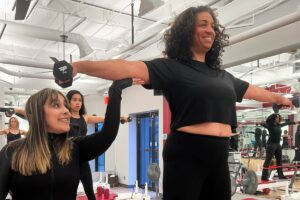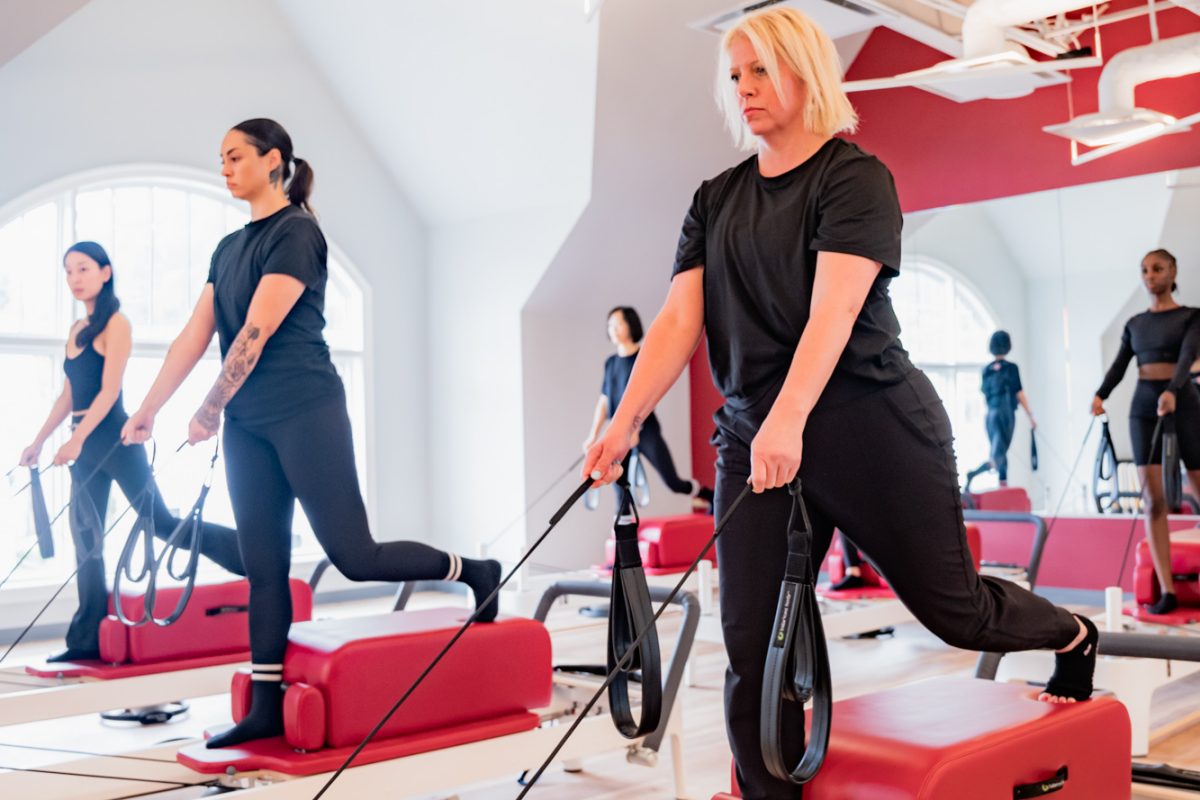 Women can expect their bodies to change continuously throughout life. There is beauty in embracing each new year and all of the developments it brings! However, women who have entered perimenopause may be struggling to see the positives, as the symptoms of this significant life change can sometimes be very noticeable.
Women can expect their bodies to change continuously throughout life. There is beauty in embracing each new year and all of the developments it brings! However, women who have entered perimenopause may be struggling to see the positives, as the symptoms of this significant life change can sometimes be very noticeable.
Thankfully, Pilates has been shown to notably improve many symptoms associated with menopause, and the advantages it offers can last a lifetime. Reformer Pilates has plenty to contribute regardless of age, from boosting endurance and circulation to decreasing the risk of injuries later in life.
Here are some basics on the data supporting why Reformer Pilates can ease women through the transition of menopause and beyond.
What Is Perimenopause?
Perimenopause is the stage before menopause starts in earnest. Menopause, or the end of a woman’s reproductive years, arises when the ovaries no longer produce eggs. Perimenopause can be an unpredictable time, as the ovaries and other reproductive organs begin to change in function but are not entirely done just yet.
Perimenopause is an entirely normal part of every woman’s life, and it does not mean that anything is wrong! It can last multiple years, usually starting in a woman’s late 40s. However, some people experience it for longer or start earlier or later than average.
How Life Changes During Perimenopause
The body is experiencing many sudden changes during perimenopause. Menstruation may become irregular as hormones no longer maintain the same homeostasis they always have. Women might find themselves grumpy, emotional, or unable to sleep, and they may develop hot flashes (especially at night).
Additionally, studies report that as many as 71% of perimenopausal women complain of musculoskeletal pain (pain in the joints and muscles). This, in turn, can lead to decreased exercise and subsequent weight gain compounded by hormonal changes.
How Pilates Can Help
While perimenopause may seem to be a stumbling block on the road to wellness, Pilates is a very effective method of addressing its effects.
Mood Swings
 It is common for women to become anxious as perimenopause kicks in. Pilates is not just a form of exercise but also focuses on looking inward. Breathing, quietude, and reflection on one’s body (to check form) are integral parts of Pilates.
It is common for women to become anxious as perimenopause kicks in. Pilates is not just a form of exercise but also focuses on looking inward. Breathing, quietude, and reflection on one’s body (to check form) are integral parts of Pilates.
While these have beneficial effects on the quality of the workout, they are also powerful actors in calming the mind and stabilizing mood. Deep breathing and slow, repetitive movements lend a sense of calm and release endorphins, which help the brain to relax and feel good.
Musculoskeletal Pain
The slow, low-impact exercises that characterize Pilates make it more suitable for perimenopausal women than high-impact alternatives. Unlike activities such as running, which require repeated hard impacts, Pilates strengthens the body without demanding such strain on joints that may already be achy.
As a result, women can avoid aggravating their musculoskeletal pain. Pilates can also encourage blood flow, which can help muscles remove waste products and decrease soreness.
Weight Gain
Most people know that exercise is one element in maintaining a healthy weight. As women struggle with weight gain during menopause, they may find that Pilates addresses multiple factors that contribute. Pilates encourages a more self-reflective attitude that can inspire women to make better nutritional and habitual choices. In addition, it offers a more accessible form of exercise to burn calories and maintain a healthy weight.
Insomnia
Anyone who has tried Pilates can confirm that while the movements may seem slow, they are far from easy! Pilates can still get anyone’s heart pumping, and just as with moderate-intensity exercises, it is common to feel tired afterward. Pilates is an excellent way to battle insomnia by wearing out the body in a healthy way so participants can sleep better.
Long-Term Health
 Studies show that while women experience a gradual decrease in bone density throughout life, this weakening speeds up noticeably in the years immediately before menopause (that is, during perimenopause). However, research also indicates that those who participate in Pilates see an increase in bone density that can protect them from dangers such as osteoporosis later in life.
Studies show that while women experience a gradual decrease in bone density throughout life, this weakening speeds up noticeably in the years immediately before menopause (that is, during perimenopause). However, research also indicates that those who participate in Pilates see an increase in bone density that can protect them from dangers such as osteoporosis later in life.
Try Pilates to Ease the Symptoms of Perimenopause
The transition into perimenopause might not be as seamless as you hoped it would be, but its effects do not need to overtake your entire life. Pilates has many benefits that contribute to helping you overcome your perimenopause symptoms while supporting the lifestyle you want to live.
The instructors at RTR Pilates make our classes accessible to anyone who wants to try, regardless of ability level or experience. Contact RTR Pilates today to sign up for a beginner class and see the difference it makes!

